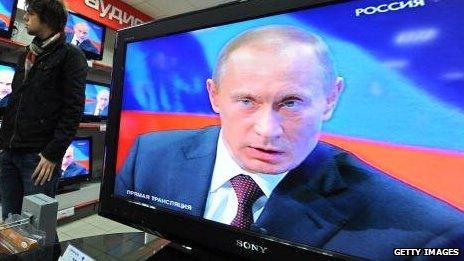Russia media react to Putin press consolidation
- Published
- comments

Will Russia's new news agency feature nothing but "campaigning and propaganda"?
On 9 December, President Vladimir Putin signed a decree disbanding state-owned news agency RIA Novosti and the international radio station Voice of Russia, replacing them with an "international news agency" called Rossiya Segodnya (Russia Today).
TV anchor Dmitriy Kiselev, an ardent Kremlin supporter known for his anti-Western and anti-gay views, was appointed the new agency's director general.
Independent Russian media have reacted with concern, wondering whether Mr Putin's move represents a triumph of "propaganda" over "creative journalism". Will state-sponsored Russian media become simply a tool for the Russian government to manipulate opinion and advance its agenda?
The following is a sampling of Russian media reaction to the move:
This week started with a revolution, or rather counter-revolution, on the market of state-run mass media. One of the most respected media outlets of the country, RIA Novosti, has been disbanded. ... New times, new people. [RIA Novosti head] Svetlana Mironyuk is a symbol of the fairly liberal 2000s. Dmitriy Kiselev is a symbol of the new time. The time when the head of a state-owned media company can no longer afford to think about 'nuances' and must instead gallop forward with his lance ready to strike "the enemies of Russia". ... Russia's image abroad is really a disaster. Not only do they not hear us, they do not want to listen. ... But could this trend be reversed with more aggressive "campaigning and propaganda" on our side? I am not sure that this extremely complicated problem has such a simple solution. - Mikhail Rostovskiy, Moskovskiy Komsomolets, external (popular daily).
The new course is based on a simple observation: society is split into conservatives and liberals at a ratio of 80:20. The decision Putin took yesterday consolidates the conservative electorate around its basic values. This is the most likely purpose of the reorganization. Dmitriy Kiselev's appointment fits this strategy, as he is an extremely conservative manager. - Petr Tverdov, Nezavisimaya Gazeta, external (centrist daily).
Everyone has been making guesses about the aims of this "reset". One of the key theories is that the government has decided not to spend money on creative journalism, but only provide budget funds for propaganda. - Yekaterina Dyatlovskaya, Novyye Izvestiya, external (liberal daily).
The realignment of forces on the public relations front has become Vladimir Putin's first administrative step amid strained relations with Ukraine and the EU. ... Today the Kremlin needs a new type of quality that is personified by TV anchor Dmitriy Kiselev. ... The way Kiselev deals with all sorts of enemies of Russia is apparently to the liking of his main viewer, Putin. - editorial, Vedomosti, external (business daily).
(From reports provided by BBC Monitoring, external)